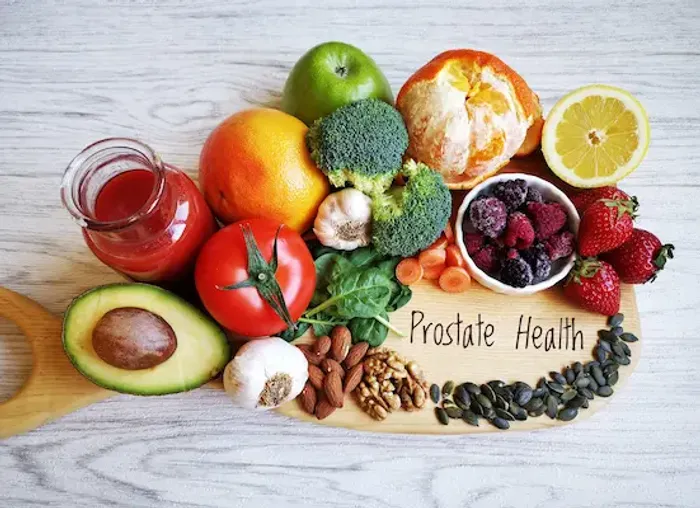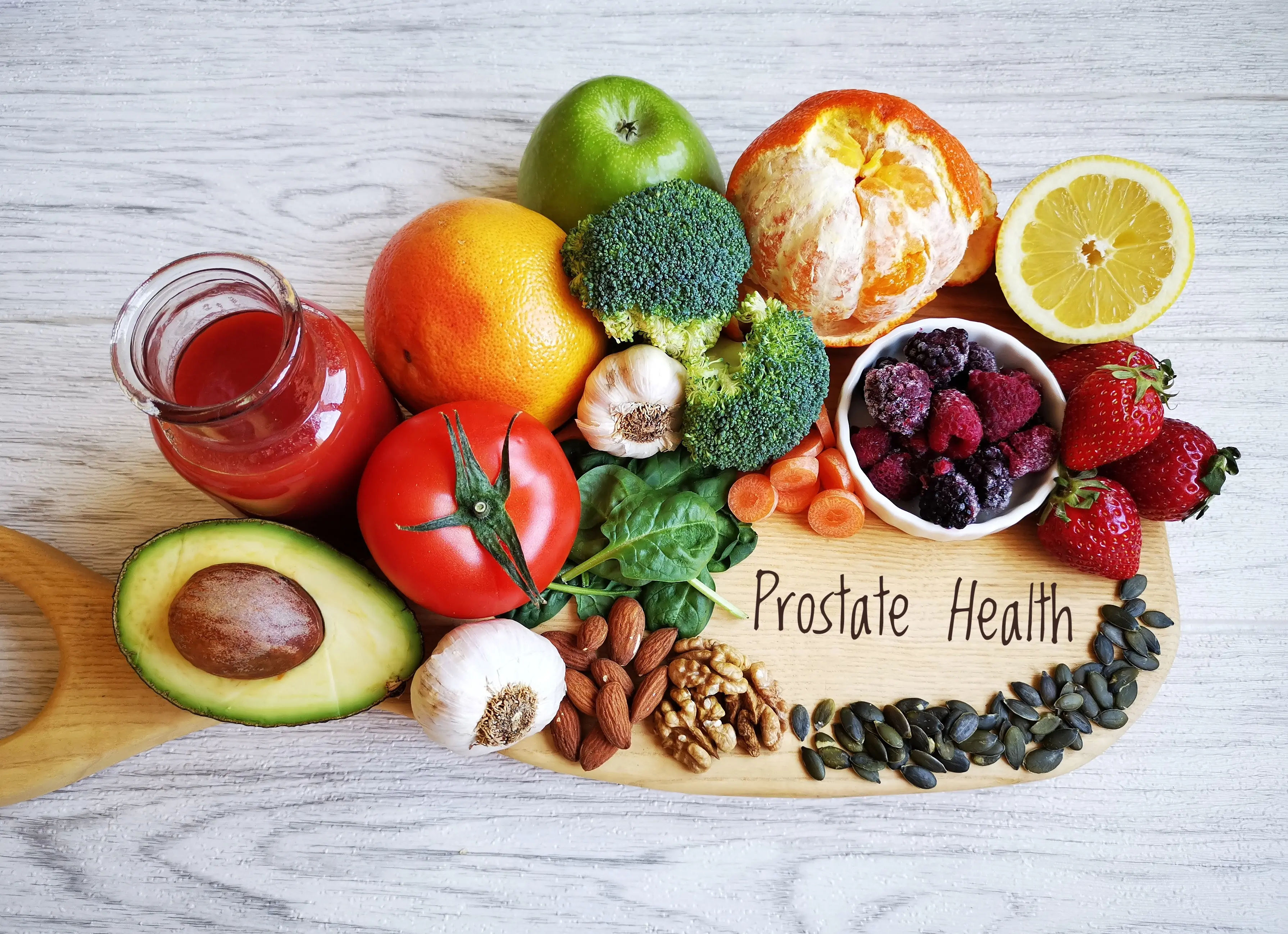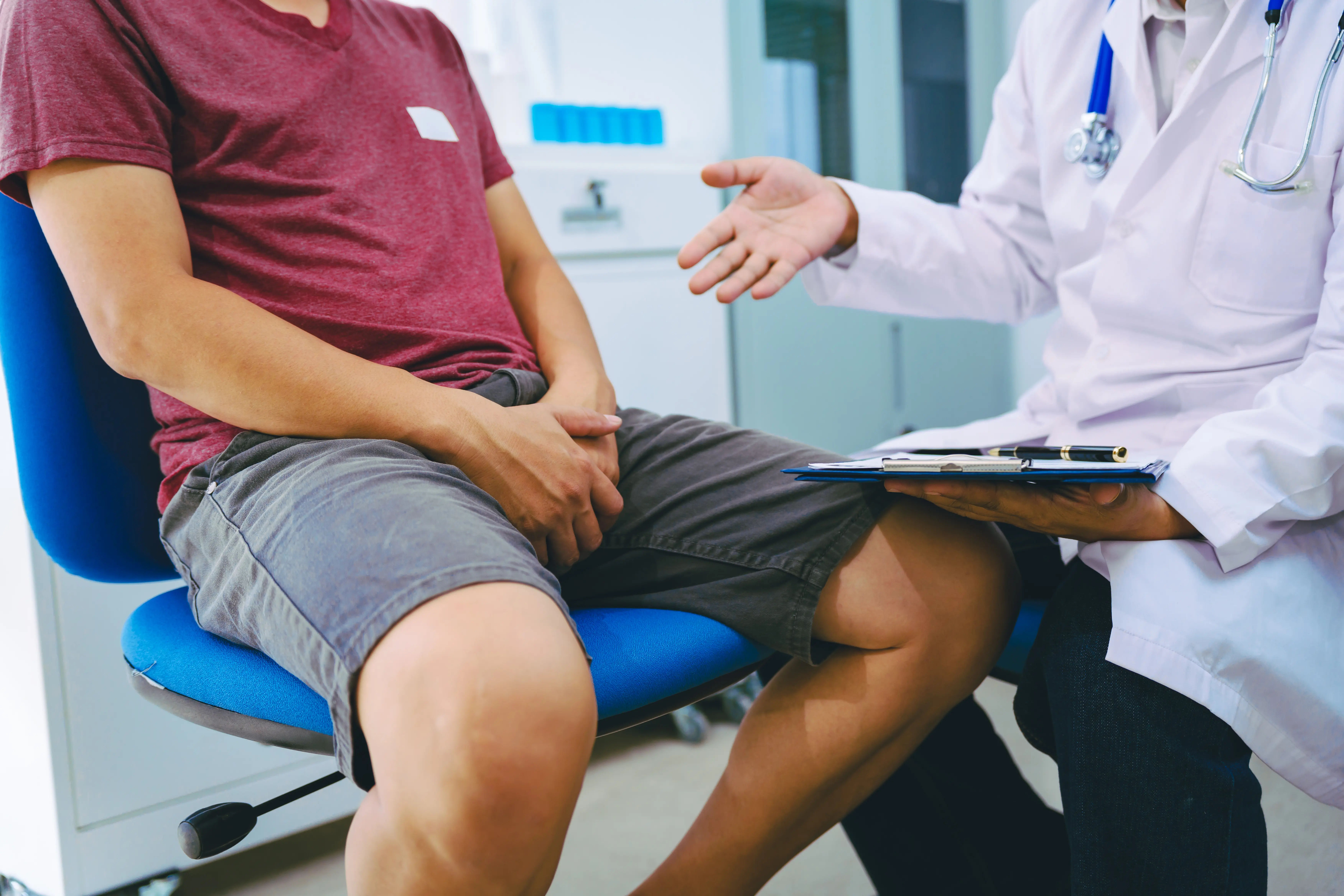Guide to Diet Role In Preventing Enlarged Prostate
Know about the enlarged prostate, what it is, the influence of food, weight and metabolic health. Learn about the supplements and daily habits.

Written by Dr. Siri Nallapu
Reviewed by Dr. J T Hema Pratima MBBS, Fellowship in Diabetes Mellitus
Last updated on 13th Jan, 2026

Introduction
If nighttime bathroom trips, weak urine flow, or urgency are starting to interrupt your life, you’re not alone. Benign prostatic hyperplasia (BPH), commonly called an enlarged prostate, becomes more likely with age—but there’s a lot you can do about it. One of the most powerful levers you control every day is your diet. While no single food “shrinks” an enlarged prostate overnight, a consistent eating pattern can reduce inflammation, support healthy hormones and metabolic balance, and lessen lower urinary tract symptoms (LUTS).
In this guide, we translate the science into practical steps for the general public. You’ll learn how diet influences BPH, which foods and nutrients support prostate health, what to limit, and how proven patterns like the Mediterranean and DASH diets fit in. We’ll cover smart hydration, a sample 7-day plan, evidence on supplements, and when to get medical help.
Understanding an Enlarged Prostate (BPH)
An enlarged prostate—medically, benign prostatic hyperplasia (BPH)—refers to a non-cancerous growth of prostate tissue that can compress the urethra and slow or obstruct urine flow. Common symptoms include urinary frequency, urgency, weak stream, hesitancy, dribbling, and nighttime urination (nocturia). Some men also feel an incomplete bladder emptying. Not everyone with an “enlarged” prostate has bothersome symptoms, and severity varies widely.
Why prevention and early self-care matter: BPH is age-associated and influenced by hormones, inflammation, and metabolic factors. While medications and procedures are effective when needed, many men can reduce or delay symptom progression through lifestyle, particularly a plant-forward, anti-inflammatory diet and weight control, which also benefits heart and metabolic health.
Consult a Top Urologist for Personalised Advice
When to get help?
Seek prompt care if you have urinary retention (inability to urinate), pain, blood in urine, fever with urinary symptoms, or bladder infections. If you’ve had persistent urinary symptoms for more than two weeks, consult a doctor online with Apollo24|7 for further evaluation. Your clinician may use a symptom questionnaire (IPSS), a rectal exam, urine tests, and sometimes PSA blood tests or imaging.
How Diet Influences Prostate Size and Symptoms
Diet affects BPH via several interconnected pathways.
Inflammation and oxidative stress: Diets rich in vegetables, fruits, whole grains, legumes, and nuts deliver antioxidants and polyphenols that help modulate inflammatory signalling and oxidative stress factors linked to prostate tissue growth and irritative urinary symptoms. Ultra-processed foods high in refined carbs, added sugars, and certain fats can push inflammation in the opposite direction.
Insulin resistance and hormones: Insulin resistance and metabolic syndrome are associated with larger prostate volume and faster BPH progression. High added sugar intake and refined starches can worsen insulin spikes. Conversely, an anti-inflammatory, lower-glycemic eating pattern (think Mediterranean or DASH diet) supports better insulin sensitivity, healthier sex hormone dynamics, and potentially slower prostate growth.
Microbiome and fibre: Your gut microbes transform dietary fibre into short-chain fatty acids (SCFAs), which may have systemic anti-inflammatory effects. While microbiome–prostate research is emerging, higher fibre diets correlate with better metabolic health and lower inflammation, which, in turn, relate to milder LUTS.
Foods and Nutrients That Support Prostate Health
A “prostate-smart” plate centres on plants, with protein from fish and legumes, and healthy fats.
Vegetables (especially crucifers) and tomatoes: Broccoli, cauliflower, kale, and Brussels sprouts provide glucosinolates and antioxidants. Tomatoes (and tomato paste/sauce) deliver lycopene, a carotenoid linked to prostate benefits in observational studies. While lycopene evidence is stronger in cancer epidemiology, a tomato-rich pattern is reasonable for overall prostate support. Use cooked tomato sauces with olive oil to boost lycopene absorption.
Whole grains, legumes/soy, nuts, and seeds: Whole grains (oats, barley, brown rice), beans, lentils, and chickpeas help stabilise blood sugar and improve insulin sensitivity. Soy foods (tofu, tempeh, edamame) provide isoflavones that may have modest hormone-modulating effects, though data for BPH are mixed. Nuts (walnuts, almonds) and seeds (pumpkin, flax, sesame) offer healthy fats, fibre, and phytosterols. Pumpkin seeds are a traditional food explored in BPH studies; some trials report symptom reduction.
Fish and omega-3s; herbs and polyphenols: Fatty fish (salmon, sardines, mackerel) deliver omega-3s supporting anti-inflammatory pathways. Though direct BPH effects are not firmly established, cardiometabolic gains help the root drivers. Herbs/spices rich in polyphenols turmeric, ginger, rosemary, oregano, and green tea, provide anti-inflammatory compounds; they’re best used as part of an overall pattern rather than as isolated “cures.”
What to Limit: Foods and Habits That May Worsen BPH
Red/processed meat and high-fat dairy: Diets high in processed meats and saturated fats are associated with more inflammation and may correlate with worse urinary symptoms in observational studies. If you eat red meat, make it occasional and choose lean cuts; swap in legumes or fish several nights a week. Consider low-fat yoghurt or milk over full-fat dairy if you consume dairy.
Sugary foods/drinks and refined carbs: Sweetened beverages, desserts, and refined grains (white bread, pastries) spike glucose/insulin and promote weight gain—both linked to larger prostates and more severe LUTS. Replace with water, sparkling water, or unsweetened tea; choose intact grains like oats, quinoa, or barley.
Alcohol, caffeine, and other bladder irritants: Alcohol and caffeine can increase urine production and irritate the bladder lining, worsening urgency and nocturia for some men. You don’t necessarily need to eliminate them—set a personal threshold. Try limiting coffee to mornings, switching to half-caf or green tea, and capping alcohol at modest levels with at least two alcohol-free nights weekly.
Evening fluids and salt: Heavy fluid intake or salty dinners drive nighttime urine production. Shift most fluid earlier in the day and aim for modest sodium, especially after 6–7 PM.
Proven Eating Patterns: Mediterranean, DASH, and Plant-Forward
The strongest evidence favours overall patterns, not single “superfoods.”
Mediterranean diet: Emphasises vegetables, fruits, legumes, whole grains, nuts, olive oil, and fish, with limited red/processed meat and sweets. Studies link higher Mediterranean diet adherence to lower risk of severe LUTS and better metabolic profiles that relate to BPH risk [5,6]. Long-tail keyword: Mediterranean diet for BPH.
DASH diet: Built around fruits, vegetables, whole grains, low-fat dairy, and lean proteins, DASH lowers blood pressure and improves insulin sensitivity. Given the metabolic underpinnings of BPH, DASH’s benefits likely translate to fewer symptoms over time [2].
Plant-forward: You don’t have to be vegetarian to get benefits. Start by making 2 of 3 meals meat-free, using beans or tofu; swap butter for extra-virgin olive oil; choose whole grains most days.
Weight, Metabolic Health, and the Prostate
Excess body fat, especially abdominal fat, raises inflammation, worsens insulin resistance, and is associated with greater
prostate volume and faster BPH progression. The good news: modest weight loss (5–10%) can substantially improve
metabolic markers and often eases LUTS.
Practical strategies:
- Plate method: Half vegetables, a quarter whole grains, a quarter lean protein, with olive oil or nuts as your fat.
- Fibre first: Start meals with salad or vegetable soup; add beans to at least one meal daily.
- Protein pacing: Include 20–30 g protein at each meal (e.g., Greek yoghurt + nuts; lentil soup + whole grain; fish +
vegetables). - Smart carbs: Choose intact grains (steel-cut oats, barley) that blunt glucose spikes.
- Sleep and stress: Poor sleep and chronic stress disrupt appetite and hormones. A consistent bedtime and short daily
walks after meals improve insulin sensitivity and reduce nighttime symptoms.
Supplements and Herbal Options: What the Evidence Says
Beta-sitosterol: A Plant sterol found in many prostate supplements. Meta-analyses report modest improvements in
symptom scores and urinary flow versus placebo [4]. Dosing varies; effects typically appear after several weeks.
Pumpkin seed (Cucurbita pepo): Some randomised trials suggest improvements in IPSS scores and quality of life
compared with placebo, though sample sizes are modest [7]. Whole seeds are nutritious; standardised extracts are used in studies.
Pygeum africanum: Limited evidence suggests possible symptom relief; quality and dosing vary across products.
Saw palmetto (Serenoa repens): A high-quality Cochrane review found no significant benefit over placebo for LUTS/BPH despite its popularity [3]. If you choose to try it, monitor for a response within 8–12 weeks and discontinue if ineffective.
Daily Habits Beyond Diet: Hydration, Exercise, and Sleep
Hydration timing: Total daily fluids matter less than timing. Aim for most fluids before late afternoon. Reduce intake
2–3 hours before bedtime, and keep dinner lower in salt to limit nocturia.
Exercise: Regular aerobic activity (150 minutes/week) and twice-weekly strength training help reduce inflammation
and improve insulin sensitivity, easing LUTS. Even brisk 10-minute walks post-meals make a difference.
Pelvic floor basics: Gentle pelvic floor exercises can improve urgency and control in some men. Consider guidance from
a pelvic health therapist if urgency or leakage is a problem.
Bladder training and trigger tracking: Gradually extend intervals between bathroom visits by 10–15 minutes, within comfort. Log caffeine, spicy foods, acidic foods, and carbonated drinks to identify personal triggers.
Putting It All Together: 7-Day Plan and Shopping List
Sample 7-day menu (condensed ideas):
- Breakfasts: Steel-cut oats with walnuts and berries; vegetable omelet with tomato and olive oil; unsweetened yogurt
with chia, flax, and fruit. - Lunches: Lentil soup + side salad with olive oil; quinoa–chickpea–tomato bowl; whole-grain wrap with hummus,
vegetables, and grilled fish. - Dinners: Tomato-based bean stew with barley; baked salmon, roasted broccoli, and sweet potato; tofu stir-fry with
mixed vegetables over brown rice; whole-wheat pasta with marinara (tomato paste) and mushrooms. - Snacks: Pumpkin seeds, fruit, carrot sticks with tahini, green tea (earlier in the day), sparkling water with lemon.
Grocery list highlights:
- Produce: Leafy greens, crucifers, tomatoes/tomato paste, onions, garlic, berries, citrus.
- Proteins: Beans, lentils, tofu/tempeh, fish, Greek yogurt (if using dairy), eggs.
- Grains: Oats, barley, quinoa, brown rice, whole-wheat pasta.
- Fats: Extra-virgin olive oil, nuts (walnuts/almonds), seeds (pumpkin/flax).
- Pantry: Herbs/spices (turmeric, oregano), canned tomatoes/beans, low-sodium broth.
Tracking Progress and When to See a Doctor
- Track symptoms: Use the International Prostate Symptom Score (IPSS) weekly to see patterns and improvements. Bring scores to appointments.
- Monitor metrics: Waist circumference, weight, and step counts help track underlying drivers (inflammation, metabolic
health). - Labs to discuss: PSA (as appropriate based on age/risk), fasting glucose/HbA1c, fasting lipid panel, and vitamin D may
aid risk stratification and personalisation. Apollo24|7 offers convenient home collection for tests like vitamin D or
HbA1c.
Red flags:
- Inability to urinate, fever, flank or severe pelvic pain, blood in urine, recurrent infections—seek urgent care.
- If symptoms persist beyond two weeks despite diet and lifestyle changes, consult a doctor online with Apollo24|7 for
further evaluation. If medications are started and you have ongoing issues or side effects, book a physical visit to a
doctor with Apollo24|7.
Conclusion
An enlarged prostate isn’t an inevitable destiny—your daily diet and habits meaningfully influence the terrain on which BPH develops and progresses. By centring meals on vegetables (with tomato and crucifer standouts), whole grains, legumes, nuts, seeds, and fish, and by using olive oil in place of saturated fats, you create an anti-inflammatory, metabolically healthy environment that can ease urinary symptoms and potentially slow prostate enlargement. Complement this with smart hydration timing, regular exercise, and adequate sleep, and you’re targeting the key drivers of BPH from multiple angles.
Supplements can play a supporting role in select cases, but the strongest and safest gains come from pattern-based eating like Mediterranean or DASH diets. Lab work, medications, or procedures can be added as needed. The goal isn’t perfection; it’s consistency. Small, daily changes to your diet and routine can add up to better nights, better flow, and better quality of life.
Consult a Top Urologist for Personalised Advice
Consult a Top Urologist for Personalised Advice

Dr. Dhruv B. Patel
Urologist
12 Years • MBBS, MS, DrNB (Urology - IKDRC, Ahmedabad)
Ahmedabad
Apollo Hospitals Gandhinagar, Ahmedabad
(25+ Patients)

Dr. Rohit Bhattar
Uro Oncologist
14 Years • MBBS, MS, MCh (Urology), Fellowship in Uro-oncology and Robotic Urology (United Kingdom)
Ahmedabad
Apollo Hospitals Gandhinagar, Ahmedabad
(100+ Patients)

Dr Karthik Maripeddi
Urologist
13 Years • MBBS MS FMAS MCh URO(OSM)
Hyderguda
Apollo Hospitals Hyderguda, Hyderguda

Dr. Ramesh H
Urologist
16 Years • MBBS, MS , Mch( Urology)
Bengaluru
Apollo Clinic, JP nagar, Bengaluru
Dr. Mohammed Rehan Khan
Urologist
8 Years • MBBS, MS (General Surgery), Mch (Urology)
Barasat
Diab-Eat-Ease, Barasat
Consult a Top Urologist for Personalised Advice

Dr. Dhruv B. Patel
Urologist
12 Years • MBBS, MS, DrNB (Urology - IKDRC, Ahmedabad)
Ahmedabad
Apollo Hospitals Gandhinagar, Ahmedabad
(25+ Patients)

Dr. Rohit Bhattar
Uro Oncologist
14 Years • MBBS, MS, MCh (Urology), Fellowship in Uro-oncology and Robotic Urology (United Kingdom)
Ahmedabad
Apollo Hospitals Gandhinagar, Ahmedabad
(100+ Patients)

Dr Karthik Maripeddi
Urologist
13 Years • MBBS MS FMAS MCh URO(OSM)
Hyderguda
Apollo Hospitals Hyderguda, Hyderguda

Dr. Ramesh H
Urologist
16 Years • MBBS, MS , Mch( Urology)
Bengaluru
Apollo Clinic, JP nagar, Bengaluru
Dr. Mohammed Rehan Khan
Urologist
8 Years • MBBS, MS (General Surgery), Mch (Urology)
Barasat
Diab-Eat-Ease, Barasat
More articles from Enlarged Prostate
Frequently Asked Questions
1) What is the best diet for an enlarged prostate?
Mediterranean-style, anti-inflammatory diet rich in vegetables (including tomatoes), whole grains, legumes/soy, nuts/seeds, and fish supports metabolic health and may reduce LUTS. This “diet for enlarged prostate” is sustainable and evidence-aligned.
2) Which foods help shrink the prostate naturally?
No food shrinks the prostate overnight, but tomato products (lycopene), cruciferous vegetables, legumes/soy, and pumpkin seeds align with prostate-supportive nutrition. Focus on the overall pattern rather than a single food.
3) Does caffeine make urinary frequency worse?
For many men, yes—caffeine can increase urine production and irritate the bladder, worsening urgency/nocturia. Trial a two-week reduction, especially after midday, to find your personal threshold. Long-tail keyword: caffeine and urinary frequency nocturia.
4) Are supplements like beta-sitosterol effective for BPH?
Beta-sitosterol may modestly improve flow and symptoms in some men; pumpkin seed extract shows promise; saw palmetto often performs similarly to placebo. Discuss safety and interactions with your clinician before starting any supplement.
5) Can losing weight improve BPH symptoms?
Yes. A 5–10% weight loss often improves insulin sensitivity and reduces inflammation, which can ease LUTS. Pair a Mediterranean or DASH diet with regular walking and strength training for best results. Long-tail keyword: weight loss to improve LUTS.


.webp)